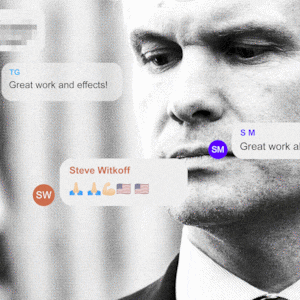The use of an unsecured messaging app by top Trump administration officials to discuss military strikes against Houthi rebels in dangerous detail will almost certainly lead to myriad legal inquiries—civil lawsuits, Congressional investigations, Office of Inspector General investigations, and criminal investigations among them.
The possible criminal and civil laws implicated involve violations of the Espionage Act, the Federal Records Act (FRA), which governs the preservation of federal records, and the Presidential Records Act (PRA), which applies to the vice president too.
The duties of the National Archives, meanwhile, include overseeing the implementation of these laws; a lawsuit has already been filed seeking a court declaration that the Signal chat is an official record subject to the FRA and enjoining the Trump administration from deleting the chats. It is not clear how many of the messages have already been deleted automatically, or whether any deleted messages can be recovered.
The Espionage Act may sound familiar—and is almost certainly a pain point in White House, because it’s the same law that President Trump was charged with violating in the case over his alleged “willful retention” of national security information at unsecured locations (yes, those boxes in a gaudy bathroom) on his Mar-A-Lago estate, and obstruction of the criminal investigation thereof.
Here, however, the likely charge would be under the act’s “gross negligence” section. That violation occurs when any person “entrusted with or having lawful possession or control of any document… relating to the national defense… through gross negligence permits the same to be removed from its proper place of custody or delivered to anyone in violation of his trust, or to be lost, stolen, abstracted, or destroyed.”
Conviction under this law carries with it fines and a potential 10-year jail term, as do charges brought for the destruction of government records that warranted official preservation. (Such a determination is precisely what the civil lawsuit before Washington D.C. Judge James E. Boasberg seeks to clarify—namely, whether the Signal chat was a government communication that participants had a duty to preserve under the FRA or, in the case of Vice President JD Vance, under the PRA.)
But if the Espionage Act conjures the ghost of the case against Trump, other potential charges call forth an even older one: Watergate. It was President Richard Nixon’s role in trying to cover up the break-in and efforts to obstruct the investigation that brought down his presidency. Charges of conspiracy, making false statements and obstructing Congress—which key Watergate players faced—may all come into play amid testimony already given by some of those involved in the Signal group chat, and there is certainly more to come.
Speaking before Congress this week, Director of National Intelligence Tulsi Gabbard and CIA Director John Ratcliffe claimed that none of the information discussed in the Signal chat was classified. These assertions have already run afoul of opinions and expertise offered by unidentified Trump officials and national security experts; Gabbard and Ratcliffe’s claims likewise elicited disbelief during the hearings.
Criminal jeopardy arising from efforts to cover up potentially illegal (and highly damaging) actions also arose during the Reagan administration’s Iran-Contra scandal. Following testimony before Congress about an secret weapons deal, an investigation resulted in charges—obstruction and lying to Congress—brought against multiple administration officials, including two of Reagan’s national security advisers and his secretary of defense (who was pardoned by Reagan before having to stand trial).
Such a spectacle seem unlikely under the Trump administration, with Attorney General Pam Bondi already asserting that she is disinclined to open a criminal investigation into “Signalgate.” Rather, she thinks Signal is great! But the attorney general cannot prevent Congressional inquiries; these subject Cabinet members and sub-Cabinet members to questioning under oath, and could elicit evidence that future attorneys general might still consider as a basis for criminal charges.
There have also been past instances where an attorney general had their minds changed following Congressional pressure. One such example came during the Clinton administration, with Attorney General Janet Reno reversing course over a decision to decline prosecution of then-ex CIA Director John Deutch. (The charge? Mishandling classified material by placing it on unsecured computers in his home.) Reno appointed a special counsel to review the case. They reached a plea bargain with Deutch before, wait for it, President Bill Clinton pardoned Deutch on his last day in office.
Indeed, Trump may view the situation differently if public opinion polling continues to show that people view “Signalgate” as a serious problem. Should this snowball further, then a question posed by Nixon during Watergate may prove instructive. Captured on the secret taping system he had set up in the White House, Nixon—who was beginning to realize the full danger of the scandal—is heard asking: “Well, who was the asshole that did this thing?”
In a case this expansive and well documented, there’s certainly more than one.










